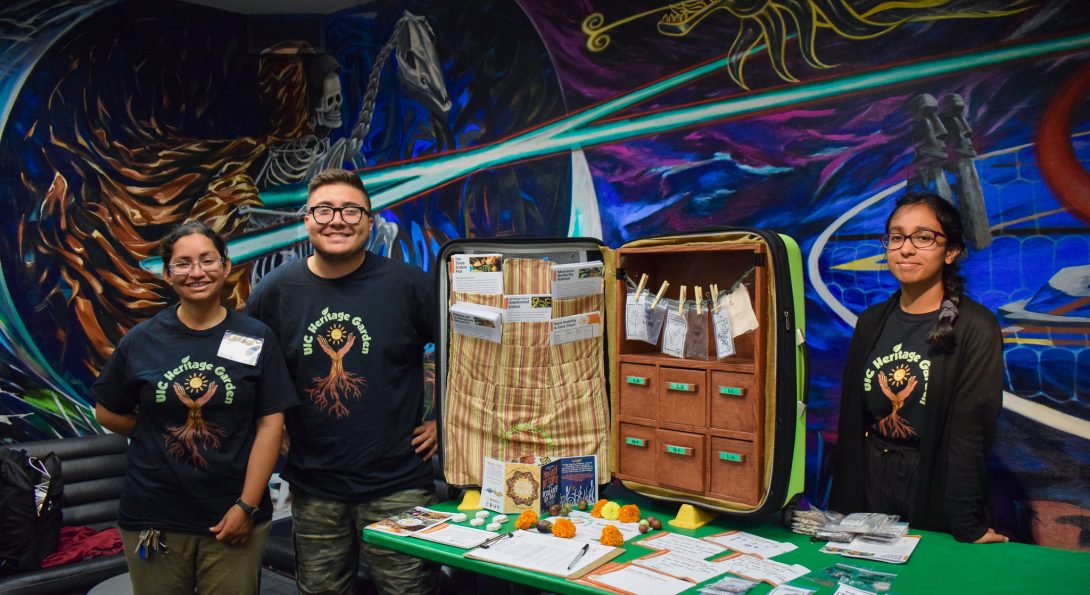Campus units launch crowdfunding campaign for Heritage Garden Seed Library

By Esther Obire
From now until April 30, the Office of Planning, Sustainability and Project Management will run a crowdfunding campaign with the UIC Latino Cultural Center to raise funds for their Heritage Garden Seed Library.
Each dollar donated toward their $2,775 goal will support the Seed Library as it continues to expand its reach across UIC and Chicago. For those interested in donating to the UIC Heritage Garden’s Seed Library, please visit the crowdfunding campaign page.
In 2015, UIC Heritage Garden students used a carry-on size suitcase to design and build a mobile seed library. This lime green suitcase full of seeds has since sprouted into a toolkit that not only educates UIC students on topics of horticulture and environmental justice, but it also provides access to seeds to those in surrounding Chicago communities.
Similar to a regular library, the Seed Library cares for seeds that have been cultivated from different sources. To start this library, the Heritage Garden in 2014 acquired the Jane Addams Hull-House Museum’s collection of seeds. These seeds and the seeds collected from the plants that grew from them serve as the foundation of the Heritage Garden Seed Library. Today, some seeds are harvested by students directly from the Heritage Garden, and others by local gardeners and donated to the library.
The Heritage Garden Seed Library is housed in the UIC Latino Cultural Center and has grown to become a crucial part of a mobile educational toolkit that fosters a culture of solidarity and learning through the gathering, sharing and preserving seeds and the stories tied to them. Currently, over 100 people from UIC and the local community use the Seed Library annually, with numbers increasing every year.
Ireri Unzueta Carrasco, the education coordinator at the UIC Heritage Garden, explains that one of the fundamental goals of the Seed Library is to encourage students to have discussions surrounding accessibility to seeds.
“We discuss the idea that people should have the right to grow their own food, and this comes with a lot of different aspects such as access to uncontaminated land, especially as communities of Color are situated in areas of higher pollution due to environmental racism,” Unzueta Carrasco said.
In addition to serving as a conversation starter about environmental discrimination, racism and justice, the Seed Library emphasizes the need for understanding the historical origins of the practice of seed stewardship and its relevance in modern society.
According to Unzueta Carrasco, many of these conversations introduce a perspective that challenges the commodification of seeds. Especially as people continue to be denied access to seeds and viable land upon which to cultivate them, seed sharing is not only a horticultural practice, but also a practice of reclaiming cultural resources.
“A seed is a living being just waiting to wake up and grow, and there are special connections to the plants and the seeds. They’re not just a resource and a thing to be sold; they’re their own living beings with their own connections to different communities,“ Unzueta Carrasco said. “I think that saving the seeds and having those discussions with students is a really important component when we’re thinking about our relationship as human beings to the rest of the planet — not just other cultures, but other beings and other ecosystems.”
The Heritage Garden Seed Library continues to expand its roots across campus and beyond through community engagement, involvement and partnerships. Annually, the Seed Library hosts a free Spring Seed Swap event to bring together gardeners, organizations, community members, and students interested in learning more about the tradition of seed conservation and sharing. It is a space that also intentionally centers groups doing social justice and environmental justice work in the Chicago area.
Attendees of the Seed Swap event can donate their own seeds, pick up seeds that others have donated, or both. Some groups that have attended and donated to the event in the past include the Field Museum, the American Indian Center, the Lurie Garden, the University of Illinois extension, Marimacha Monarca press, the Little Village Environmental Organization, Telpochcalli Community Education Project, and more.
Looking toward the future of the Heritage Garden Seed Library, Unzueta Carrasco said they are hopeful about the expansion of the program, but above all, they want the students to guide the program’s direction.
“One of the things that the internship is really focused on is the leadership of the students,” Unzueta Carrasco said. “So I think for me, the Seed Library is important and I want to see it expand, but I think our students sometimes have other ideas about what they want to do. My job is to make sure that we can accomplish the visions that they have together about how they want to see the library grow.”
Inspired by the efforts of the Heritage Garden Seed Library to diversify and transform the educational experiences of UIC students and seed sovereignty in the local community, the Office of Planning, Sustainability, and Project Management’s new fundraising platform, Growing Green for UIC, has launched its first-ever fundraising partnership with the Latino Cultural Center to support the UIC Heritage Garden Seed Library and its programs.
Categories
